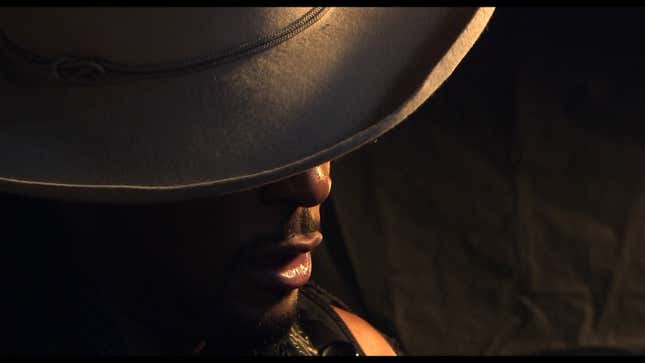
“What feeds your soul?” D’Angelo asks. For him, it’s God. It’s Yahweh. And for any fan who wonders why an artist decided to take a 14-year-long hiatus at the height of his career, maybe the answer rests in his gut—maybe, even with the superfluous reinforcement, he was starving.
Directed by Carine Bijlsma, the documentary Devil’s Pie - D’Angelo, which premiered at the Tribeca Film Festival on Monday, is a rare and intimate portrait of “one of the most mysterious figures in the contemporary music scene.” Mysterious, indeed, as following the success of his debut album Brown Sugar (1995) and the supreme success of his follow-up, Voodoo (2000), D’Angelo didn’t release another music project until 2014.
Perhaps what keeps D’Angelo going, however, is the support system that surrounds him. In fact, for the first 15 minutes or so, you don’t hear D’Angelo speak, it’s the people who know and love him, an intentional choice by Bijlsma, who confirmed she formulated the doc’s structure like an “opera.”
As Questlove notes in the doc, D’Angelo was the “most pure singer on earth.”
Questlove had a heavy collaborative hand in Voodoo, along with Raphael Saadiq, Erykah Badu, Q-Tip and others as part of the Avengers-style melodic collective known as the Soulquarians. Devil’s Pie takes the audience and sits them down with some of the most prolific musicians of that time and beyond. Additionally, there are clips of folks like Black Panther Party co-founder Bobby Seale and Dave Chappelle, the latter of which certainly knows what it’s like to take an extended break from the industry for personal reasons.
Devil’s Pie gets to the root (heh) of who D’Angelo is—or more accurately, who Michael Eugene Archer is. D’Angelo is considered to be one of neo soul’s sustainers—dubbed by his peers as “The Chosen One”—an archetype this documentary aptly strips down to the artist’s soul.
Following someone with a journey such as D’Angelo’s, a chronicling could easily be turned into something exploitative. This isn’t sensationalism, however. It’s story. His story. His soul.
Juxtaposed between stunning shots of the James River, Bijlsma travels with the camera back to Richmond, Va., where a much younger D’Angelo played the piano and sang during worship at his local Pentecostal church. There’s great footage of his beloved and now dearly departed grandmother crescendoing into a full shout, giving all glory to God in a moment all black folks raised in church can find familiarity in.
“I got to learn a lot about his spiritual background. And that was a beautiful world,” Bijlsma said at the Q&A session following the screening.
Taking what he learned about music in church, D’Angelo flipped it into his own style in what Questlove described as “blatantly and beautifully disrespectful to melody and structure.” The funkiness of Brown Sugar was born, and so was D’Angelo’s acclaim.
Then, that video happened. Y’all know the one.
I attended a press screening of Devil’s Pie, and one of the most memorable moments came from this video right here—the song that didn’t even have a title, yet somehow had a subtitle: Untitled (How Does It Feel). From the moment we saw the glistening high-definition cornrows, each woman in the audience let out a piercing gasp of lust. We all reverted back to the time we first laid our eyes on that V-cut, highlighting his pulchritudinous pelvis. For me, it was like a flashback to a 15-year-old Tonja, smack dab in her hormonally teenage reckoning, dilated pupils partaking what could only be described as a sexual awakening, sponsored by MTV.
“You’re on the stage and there’s such a high, then you get off the stage and it’s just you,” D’Angelo muses backstage in the documentary.
Just. You.
That is what D’Angelo had to come to terms with after quickly being swept up in the uncontrollable whirlwind known as super-fame. Obviously and immediately transformed into an international sex symbol, D’Angelo became increasingly uncomfortable with his status after the initial high wore off, of course. He soon realized he wasn’t the velvet voice or the talented musician—he was a caricature.
Suddenly, aside from a sea of mugshots, car accidents, and drugs, D’Angelo seemed to vanish. The “D’Angelo” his fans had come to adore ... was gone. Fourteen years.
Then, in 2014, came the critically acclaimed Black Messiah.
As we follow D’Angelo on tour, we also get to know his band, The Vanguard, featuring keyboardist Cleo “Pookie” Sample, drummer Chris “Daddy” Dave, bassist Pino Palladino, guitarists Jesse Johnson and Isaiah Sharkey, and vocalist Kendra Foster. Bijlsma noted she rode on the Black Messiah tour bus while shooting the documentary, seeing the world two-times over and truly got to know and love D’Angelo as a person, having been a fan prior. That access was apparent, as the audience was treated to a point-of-view intimacy of the tour, from D’Angelo’s hair-braiding prep to sweatily dapping up his fans in the front row.
The documentary ends with a single shot on D’Angelo as his sharp church scream reverberates the room of his makeshift studio. You can’t help but wonder, “what’s next?”
A caption appears with a hopeful hint of more D’Angelo: a new and fourth album is on the horizon, though the release date is as yet unknown—much like the album’s curator and subject of the documentary. D’Angelo is notoriously private, but Devil’s Pie will surely give you a taste of the man behind that voice.

